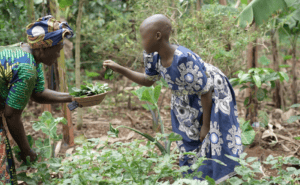Navigating HIV with a Social Worker’s Compassion
January 29th, 2024 | Stories
Angella, a 16-year-old who lives with HIV in Kampala, Uganda, started taking antiretroviral therapy (ART) when she was born. As she got older, her inconsistent use meant the treatment wasn’t working the way it should. Lilian, a social worker with Reach Out Mbuya, a partner of the USAID Integrated Child and Youth Development (ICYD) Activity, was connected with Angella to find out why she was having trouble taking her medication.
When she visited Angella’s home, Lilian learned that because her mother and primary caregiver (who also lives with HIV) lacked a stable source of income, Angella did not have consistent nutrition and could no longer attend school. Angella’s physical and emotional distress, combined with the fact that she did not know she had HIV, had led her to stop ART.
I was struck by the urgency and need to help this household. I was concerned that a young girl had painfully dropped out of school,” said Lilian.
Together, Lilian and Angella’s mother created an action plan that included telling Angella about her HIV status and re-enrolling her in school, and finding a source of income. After her mother told Angella that they were both living with HIV, Lilian explained that ART, when taken consistently, made people healthy. When Angella re-enrolled in school, they told the school matron about her HIV status so that she could store and administer the medication at the correct time. Lilian continued visiting the school to ensure that Angella was adjusting and getting her medication, and ICYD paid the fees for the remainder of Angella’s school terms.
For 3 years, ICYD worked to respond to the HIV and child protection needs of nearly one-quarter of a million Ugandans. ICYD conveyed crucial information through economic strengthening and parenting platforms on keeping children safe, healthy, stable, and in school. The peer support groups that it sponsored gave nearly 150,000 young people information and confidence to make healthy choices.
Angella joined the peer support group at her local health facility, where she received counseling and treatment information. Support group members motivated each other to stick to their treatment to achieve their health goals.
I was grateful for the disclosure support, and being a part of the peer group helped me accept my status,” Angella said.
Lilian enrolled Angella’s mother in parasocial worker training so she could support her household financially and help her daughter and other community members living with HIV adhere to ART. ICYD also gave her seeds to start a garden so she could improve her family’s nutrition with vegetables and a second source of income. “I make at least UGX 3,000 daily from selling eggplants,” Angella’s mother said.

In April 2023, two years after meeting Lilian, Angella’s viral load was undetectable. In August, when ICYD ended, all the children and adolescents living with HIV who were involved in the activity were retained on antiretroviral therapy.
Angella’s dedication to her treatment, the support she received from the program, and the adolescent peer group at the facility were vital to her viral load suppression. We are incredibly proud of her,” said Lilian.
The USAID ICYD Activity was led by the Education Development Center and implemented in partnership with the Bantwana Initiative of World Education, and government, civil society, and community actors across Uganda.
World Education fosters enduring partnerships across regions and sectors to advance education outcomes for all. We offer education systems strengthening, program design and implementation, applied research and evaluation, capacity development, and policy development services.